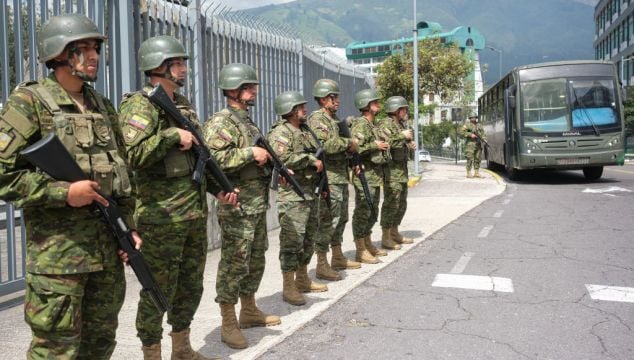Ecuador president Daniel Noboa said on Wednesday that his country was "at war" with drug gangs who are holding more than 130 prison guards and other staff hostage and who briefly captured a TV station live on air and set off explosions in a surge of violence that has left city streets deserted.
Mr Noboa on Tuesday named 22 gangs as terrorist organisations, making them official military targets. The president took power in November pledging to tackle a growing security problem caused by a rise in drug-trafficking gangs transporting cocaine through Ecuador.
"We are at war, and we cannot cede in the face of these terrorist groups," Mr Noboa told radio station Canela Radio on Wednesday.
The hostage-takings, which began in the early hours of Monday, and the apparent escape of Los Choneros gang leader Adolfo Macias from prison over the weekend, spurred Mr Noboa to declare a 60-day state of emergency.
TV station takeover
He hardened the decree on Tuesday after a series of explosions around the country and a dramatic takeover of a TV station by gunmen live on air.
The government has said the violence is a reaction to Mr Noboa's plan to build new high-security prisons for gang leaders and Mr Noboa told the radio station that a design for two new facilities will be made public tomorrow.
"We are making every effort to recover all the hostages," Mr Noboa said, adding the armed forces have taken over the rescue effort. "We are doing everything possible, and the impossible, to get them safe and sound."
The SNAI prisons agency has said guards account for 125 of the hostages, while 14 are administrative staff. Eleven people were freed on Tuesday, it said.
Videos circulating on social media showed prison staff being subjected to extreme violence, including being shot and hanging. Reuters could not immediately verify the authenticity of the videos.
Mr Noboa said the country will begin to deport foreign prisoners, especially Colombians, this week to reduce prison populations and spending.
There are some 1,500 Colombians in prison in Ecuador, Mr Noboa told the radio station, adding that prisoners from Colombia, Peru and Venezuela account for 90 per cent of jailed foreigners.
Colombia's justice minister told local radio on Tuesday he was willing to work with Ecuador, but that Colombian law dictates repatriations must be assessed on a case-by-case basis and be based on requests from prisoners themselves.
Colombia has, like many Latin American countries, expressed its support for Ecuador's government, and said on Wednesday it would increase military presence and controls along their nearly 600-kilometre shared border.
Continued violence
The best way to safeguard the economy and foreign investment would be to improve security, Mr Noboa told the radio station, as well as ensure the rule of law.
Lawmakers on Tuesday expressed their support for the armed forces and backed Mr Noboa's efforts. Mr Noboa has a majority coalition in congress, after his party allied itself both with the leftist movement of former president Rafael Correa and a Christian party.
"I don't need their approval right now for what we are doing," Mr Noboa said, referencing the decrees, "but I have asked for their support."
Mr Noboa also met with ambassadors to Ecuador in Quito on Wednesday morning.
There have been 70 arrests since Monday in response to incidents including the TV station takeover, the police said on Wednesday.
Four police officers, who authorities say were kidnapped by criminals between Monday and Tuesday, are still being held. Three other officers were freed late on Tuesday.
Police officers killed
Violence was ongoing in Guayaquil, the country's largest city, the police said, adding that they were identifying three bodies found in a burned-out car south of the city overnight.
Two police officers were killed by armed men on Tuesday in Guayas province, where Guayaquil is located. The police provided no further details.
Streets in Quito and Guayaquil were quiet on Wednesday morning, with many businesses closed.
The Chinese embassy and consulates will be temporarily closed, said China, a major investor in Ecuador.
Schools were shut nationally, with classes taking place virtually. Residents said it felt like a return to pandemic lockdowns.
"It's horrible, the streets are very empty," said Guayaquil security guard Rodolfo Tuaz, 40. "It's a very cold environment, as if there were a new Covid."







